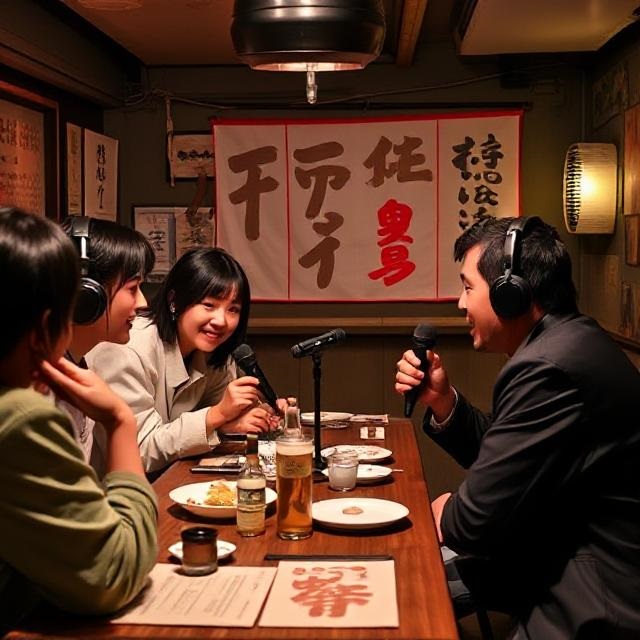Why Use Podcasts for JLPT Preparation?
If you’re studying for the Japanese Language Proficiency Test (JLPT), you already know that listening comprehension is a major hurdle. Many learners struggle with understanding natural speech, fast-paced conversations, and nuanced expressions.
That’s where Japanese podcasts come in. Unlike textbooks, podcasts offer real-life listening practice, varied accents, and cultural insights—all crucial for JLPT success. Plus, they’re flexible: you can listen while commuting, cooking, or working out.
In this guide, we’ll cover:
✅ Best podcasts for each JLPT level (N5 to N1)
✅ How to use podcasts effectively for JLPT prep
✅ Bonus tips to maximize learning
Let’s dive in!
Best Japanese Podcasts for JLPT Levels
1. For N5-N4 (Beginner Level)
If you’re just starting, you need slow, clear speech with simple vocabulary. These podcasts are perfect:
A. Sakura Tips
- Level: N5-N4
- Format: Short monologues (5 min) on daily life topics
- Why it’s great: Host Mari speaks slowly with pauses, making it ideal for absolute beginners. Plus, transcripts are available for follow-along reading 1.
- Best for: Building basic listening skills and vocabulary.
B. Japanese with Shun
- Level: N4
- Format: 6-9 minute episodes using Genki textbook vocabulary
- Why it’s great: Shun’s speech is natural but slow, perfect for Genki learners. No transcripts, but titles are in English for easy topic selection 1.
- Best for: Reinforcing textbook grammar in real conversations.
C. Nihongo con Teppei (Beginner Version)
- Level: N4-N3
- Format: Short (10 min) episodes with repetitive phrases
- Why it’s great: Teppei anticipates learner struggles and explains things simply. Great for shadowing practice 24.
- Best for: Getting used to natural speech patterns.
2. For N3 (Intermediate Level)
At N3, you need to understand longer conversations and pick up intermediate vocabulary.
A. Let’s Talk in Japanese!
- Level: N4-N2 (episodes are labeled by difficulty)
- Format: 4-12 min monologues on culture, society, and daily life
- Why it’s great: Host Tomo adjusts speed based on the episode’s JLPT level. Transcripts available for deeper study 14.
- Best for: Gradual progression from beginner to intermediate.
B. Easy Japanese Podcast (Masa & Asami)
- Level: N3
- Format: 10-20 min unscripted discussions on everyday topics
- Why it’s great: The hosts speak naturally but clearly, mimicking real-life conversations. Patreon supporters get transcripts 16.
- Best for: Improving casual listening comprehension.
C. The Real Japanese Podcast (Haru)
- Level: N3-N2
- Format: 7-15 min episodes on Japanese culture and travel
- Why it’s great: Haru speaks at a natural pace but marks episodes by JLPT level. Vocabulary lists are available for Patreon supporters 1.
- Best for: Expanding cultural knowledge while prepping for JLPT.
3. For N2-N1 (Advanced Level)
At this stage, you need fast, natural speech and exposure to complex topics.
A. Learn Japanese with Noriko
- Level: N2
- Format: 10-30 min episodes on society, books, and interviews
- Why it’s great: Noriko speaks at a natural speed but keeps explanations learner-friendly. YouTube videos include subtitles 12.
- Best for: Advanced listening and reading practice.
B. YUYUの日本語Podcast
- Level: N2
- Format: 15-30 min monologues on travel, language, and life
- Why it’s great: Yusuke speaks fast but clearly, great for high-intermediate learners. Episodes are also on YouTube with transcripts 1.
- Best for: Training your ear for native-level speed.
C. Bilingual News (バイリンガルニュース)
- Level: N1
- Format: Bilingual discussions on global news (Japanese & English)
- Why it’s great: Helps with advanced vocabulary and real-world topics. No scripts, so it’s authentic listening practice 4.
- Best for: Learners aiming for business or academic Japanese.
How to Use Podcasts for JLPT Success
Just listening passively won’t cut it. Here’s how to study effectively:
1. Active Listening Techniques
- Shadowing: Repeat phrases immediately after hearing them.
- Note-taking: Jot down new words and review later.
- Transcripts: Use them to check comprehension (if available).
2. JLPT-Specific Strategies
- N5-N4: Focus on slow speech and basic vocabulary.
- N3: Practice longer conversations and intermediate grammar.
- N2-N1: Train for fast speech and abstract topics.
3. Supplement with Other Resources
- Anki: Create flashcards from podcast vocabulary.
- Mock Tests: Use JLPT past papers to test listening skills.
- YouTube Channels: Like Japanese Ammo with Misa for extra practice.
Final Thoughts
Podcasts are a game-changer for JLPT prep. Whether you’re a beginner or advanced learner, there’s a podcast that fits your level. The key is consistency—listen daily, take notes, and challenge yourself with harder content over time.
Which podcast will you try first? Let us know in the comments!
More JLPT Resources
- JLPT Listening Section Secrets: How to Improve Comprehension in 30 Day
- How to Pass JLPT N3 in 6 Months
- NHK News Web Easy – Free Reading Practice







